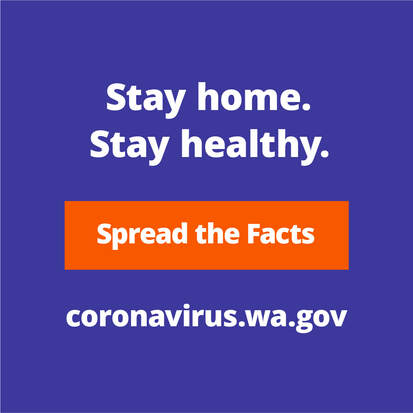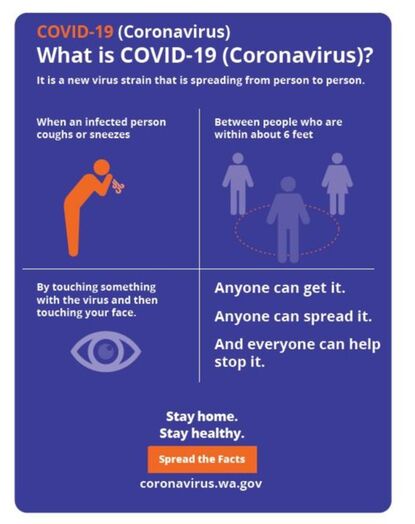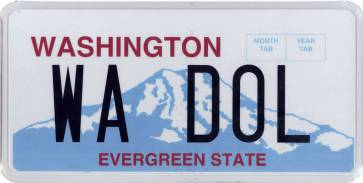 What does it mean to stay home To help stop the spread of COVID-19, Governor Inslee has asked Washington residents to stay home. You might have questions about what that means. Here are some answers that may help. Can I go outside? Yes. In fact, it is good for you to go for walks, check your mailbox, and sit in the sunshine. Just remember to stay at least six feet away from others, avoid travel, and avoid crowds. Can my family or friends come visit? You should cancel or postpone in-person visits. But, you don’t have to isolate yourself! Keep in touch with your family and friends through phone and video calls, emails and letters, and virtual gatherings. You can use phone apps and social media platforms for group conversations and video chatting. I live with other people who come and go. What do I do? Encourage everyone in your household to stay home unless they need groceries, prescriptions, or if they are still required to work. Anyone who goes out should wash their hands immediately when they get home. In your house, clean and disinfect all frequently touched surfaces, such as remote controls, phones, counter tops, and doorknobs. How can I protect myself if I have to go out? If you have to go out, carry hand sanitizer or disinfecting wipes, stay at least six feet away from others, cough and sneeze into your elbow or a tissue, and wash your hands when you get home. It’s a good idea to also clean off any items you bring home with you before you use them. How can I get groceries and prescriptions? Many grocery store chains will deliver goods and prescriptions. Stores are also reserving times for people who are older, pregnant, or have health conditions to shop. Check your local grocery store for more information. You can also ask friends and family to help you get what you need. Should I cancel my vacation plans? Yes. It is best to cancel or postpone any plans that involve traveling or being around people. Should I cancel my doctor appointments? Talk to your doctor about whether you should cancel your appointments. If you have a condition that requires treatment, your doctor may ask you to come in. Or, your doctor may be able to conduct your appointment over the phone or online. Are my pets affected? There is no evidence that people can get sick from their pets. However, the CDC recommends that you wash your hands after touching your pets, their food, waste, or supplies. Call your veterinarian of you have questions about your pet’s health. Should I wear a homemade cloth facemask? The Washington State Department of Health and the Centers for Disease Control and Prevention recommend that people wear homemade cloth face coverings when they are in public settings where they cannot maintain six feet of distance from others. This might include trips to the grocery store, pharmacy, hardware store, health clinic or similar places. This recommendation is not a substitute for existing guidance to maintain six feet of physical distance from non-household members and performing frequent hand hygiene with soap and water or alcohol-based hand sanitizer. Wearing cloth face coverings will not prevent spread of COVID-19 without these other protective measures. Can I go to my place of worship? No. Governor Inslee’s directive prohibits all gatherings, public and private. However, many places of worship are offering services over the internet. You can work with your leaders or other community members to provide services online. Will I get my Social Security benefits? Yes. If you get a phone call from someone who says there is problem with your Social Security account, hang up. Unfortunately, people are scamming others. What should I do if I start to feel sick? Call your doctor before you leave the house to get medical care. Be sure to get care if you have symptoms that are getting worse, have a chronic health condition, or have shortness of breath. If you are experiencing an emergency, call 9-1-1. How long will this last? Governor Inslee’s Stay Home, Stay Healthy order is through May 4. We will update this page as new information becomes available.
1 Comment
Watch out for stimulus payment scams The federal government is seeing an increase in scams related to federal stimulus payments including phone calls, text messages and e-mails phishing for information. The messaging includes variations of language such as "in order to receive your/your client's stimulus payment via direct deposit, we need you to confirm the banking information" and they are gathering that information via telephone or directing victims to click on a link that takes them to a website where they enter their banking information. Here are some important things to know:
South Bend, WA. – Dr. Steven Krager, Pacific County Health Officer, provided some insight on things to consider when deciding to wear a mask.
Staying home except for essential trips and ensuring you remain at least 6 feet away from others when in public are still the best ways to protect yourself from COVID-19. But non-medical masks may be used to supplement those efforts. Here are two things to consider before deciding whether to wear a mask:
When a person who is already infected with the virus (even if they don’t have symptoms) wears a fabric mask, it may help prevent the spread of infection to others. The mask can block droplets from spreading when the person coughs, sneezes or, to a lesser degree, speaks. It’s unknown how much protection homemade fabric masks provide to the person wearing the mask. The amount of protection may depend on the quality of the mask and how well it fits. This is why fabric masks should not be considered reliable protection, but they may provide some benefit. To be effective, masks should be worn consistently. Be sure to wash hands before putting on a fabric mask and after taking it off, and be careful not to touch your face with unwashed hands if adjusting the mask. Fabric masks should be changed when moist and washed after use. Masks that are worn may be contaminated.
|
|
